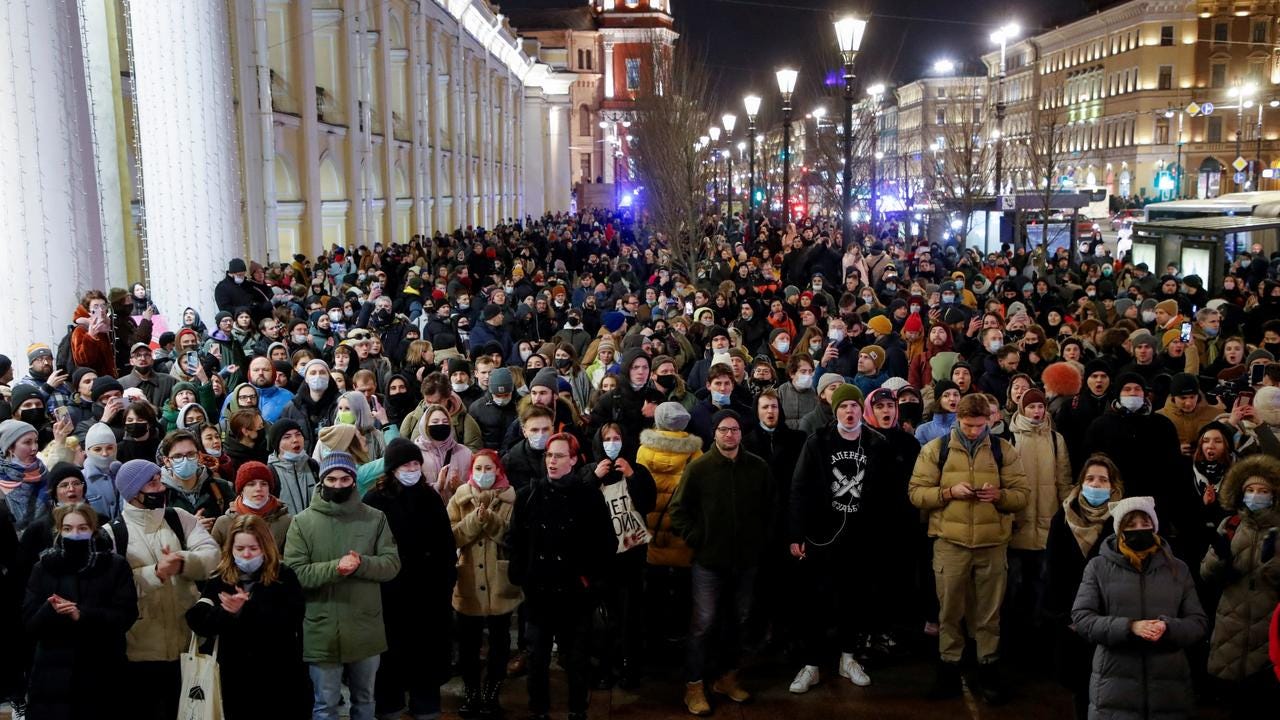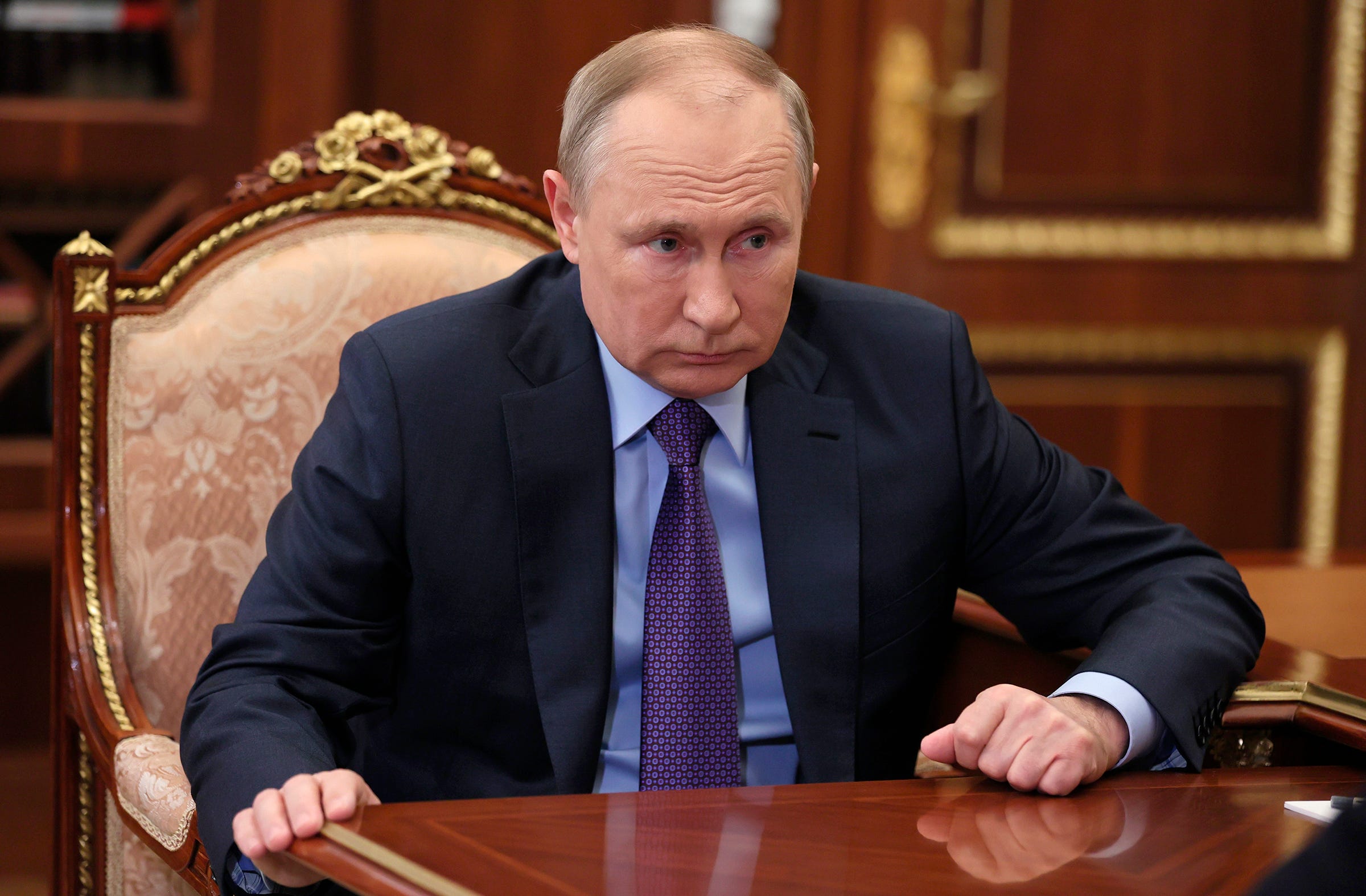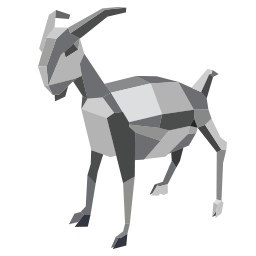The Ukraine crisis is a hinge of history. One of the biggest questions of our time is whether the hinge opens the gate to more democracy or swings back toward Russia’s autocratic past, where war and repression are the historical norm. While it's too early to know for sure, I think Tsar Putin is going to lose his bet on backwardness. He's stuck in a time warp that places him not in the company of Peter the Great but of petty dictators who overreach.
For all of his tactical military strength, Putin is now operating from a position of strategic weakness. The bitter ironies for him abound. Almost the entire international community stands against him, creating the exact Western unity he has spent two decades trying to undermine. He has reinvigorated—even saved— NATO, which just two years ago looked obsolete. We’re likely to see permanent U.S. troop deployments in Poland, Rumania and the Baltic states—exactly the outcome Putin says he is trying to prevent. And from the start, Ukraine has put up stiffer resistance than Putin expected, inspiring the world with its plucky David vs. Goliath story.
Even after Putin prevails militarily, forcibly removes Volodymyr Zelensky as president and installs a new puppet in Kyiv (Ukranian-preferred spelling), his problems will be just beginning. Unlike reformers in many former Soviet states, the Ukrainians have experience dispatching puppets, as they did in 2014 during the peaceful Maidan Revolution. It's hard to see how the new thug in charge would stand much of a chance. But the big surpise so far is the resistance inside Russia. Despite stern warnings that taking part in antiwar demonstrations would be on their records “for life,” tens thousands of Russian protesters in 53 Russian cities took to the streets on the first day of the invasion. So much for rallying around the flag. Even in open societies, it usually takes years for an antiwar movement to gather steam. In Russia, it took only hours.

Surprisingly, Putin has muffed the psyops dimension to the crisis, watching his false flags shot down by an impressively-proactive Biden Administration that is redefining the use of intelligence. Instead of hoarding it as policymakers have done for centuries, Biden skillfully declassified and released good intel about Putin’s intentions to keep him off-balance in the run-up to the invasion. The U.S. is showing how those prebuttals can often go viral, undermining even the most aggressive propaganda. So now the old KGB man's reputation as a master of disinformation is taking a beating. Russia’s endless attempts to lie about the invasion are not getting traction anywhere. Just when we thought the internet echo chamber was a menace to democracy, its basic transparency has helped bring misinformation to light. And with social media ubiquitous, the power of state-run media to keep people in the dark is waning.
In the past, Putin hasn’t much cared about public opinion inside Russia. He didn’t blink at surveys earlier this month showing fewer than ten percent of Russians supporting an invasion of Ukraine. But upbeat state media reports about the kindness of Russians toward Ukrainians amid the military operation (the Russian government is not calling it a “war”) suggest he is already on the defensive. He knows the political danger of watching Russian boys come home in body bags. And Biden’s harsh new economic sanctions will inflict well-deserved punishment even if they don’t provide much deterrence. I’m looking forward to seeing oligarchs complain about losing their yachts and fancy London and Sunny Isles apartments.
To get a bit closer to how historians may some day view the Ukraine Crisis, let’s look at Soviet invasions that this one does not resemble:
This is not 1945, when the Red Army occupied Eastern Europe and easily threw out non-communist leaders because those countries had just been through World War II and were too worn out to fight; the Ukrainians always intended to battle the Russians, even if Putin was too arrogant and isolated to grasp that.
It’s not 1956, when poorly-armed Hungarian freedom-fighters could only hold out for five days before being crushed by Soviet tanks; Ukrainian insurgents will be killing Russians for as long as they or their strongman stooges are occupying their country.
It’s not 1968, when the independent Czech communist leader, Alexander Dubcek, told his people during the Prague Spring that they should submit to the invading Soviet forces to prevent bloodshed; this time, the death toll will quickly mount into the thousands and likely go a lot higher.
And it’s not 2015, when Russia occupied Ukraine’s Crimean Peninsula without resistance, in large part because that region was majority-Russian and viewed by millions as legitimately Russian. Ukraine is a much bigger meal, and one that Putin is already having a harder time swallowing. He is so isolated from honest advice that he seemed blindsided by early events.
The best comparison might be to 1980, when the Soviets invaded Afghanistan. Soviet operatives killed the Afghan president and installed a puppet. The Carter Administration imposed sanctions—including a grain embargo and Olympics boycott—that were initially very popular in the U.S. but became much less so over time, as the shock of the invasion wore off. That will likely happen this time, too. But consider what happened next: a nine-year U.S.-backed insurgency that bled the Soviets dry and contributed heavily to the demise of their empire.
Putin loathes how Lenin and Stalin gave Ukraine more cultural identity than he thinks it deserved. But he nonetheless feels personally embarrassed by the demise of the Soviet Union. Shame is a powerful motivator, even if the shamed must wait decades to exact their revenge. So it’s no surprise that the Cold War conditions everything he does, from preposterous propaganda (calling for the “de-Nazification” of a country with a Jewish president) to making lists of enemies to be seized (including Zelensky, who would immediately become a global martyr if he’s killed), to brandishing nuclear weapons, as he did in his reckless speech this week.
But he nonetheless feels personally embarrassed by the demise of the Soviet Union. Shame is a powerful motivator, even if the shamed must wait decades to exact their revenge.
That takes the New Cold War into dangerous territory. As NATO forces line up directly across from Russian troops on Ukraine’s borders, the chances for miscalculation increase.
But if the world can avoid a cataclysmic superpower confrontation, the Ukraine crisis has a chance to eventually end in a positive way, with the global struggle between autocracy and democracy moving back toward freedom. That doesn’t necessarily mean Putin gets deposed, but it suggests that the hinge might be swinging in the right direction.






Mr. Alter, I appreciate your detailed response to my contentions.
I am not morally neutral on slavery. Of course, I found slavery reprehensible.
The North found that the odium of slavery superseded any right the South might have had to secede. And the North denied the South the right to secede even though neither constitutional law, nor any federal statutory law, forbade the right to secede.
Similarly, Russia is entitled to deny Ukrainian separatism because Ukrainian nationalism at this juncture seems part and parcel of a plan to endanger Russia. All Russia and its allies ask for is Ukrainian neutrality and the exclusion of Ukraine from Nato.
In 1953, Moscow and Washington agreed that Austria would be neutral. When was the last time Austria was attacked by the big bad Russian bear ?
During the cold war, Rumania followed a foreign policy that was independent of Moscow and Washington. When was Rumania attacked by the big bad Russian bear ?
Some historians report that at Yalta, Churchill and Stalin envisioned how Eastern Europe would be divided. They scribbled numbers on an envelope. Churchill and Stalin agreed that the West would have a 90 percent controlling interest in Greece and that Russia would have a 90 per cent controlling interest in Rumania. The notion that super powers may divy up the world like this may seem offensive to contemporary -- and dare I say delicate and adolescent ears -- but grand designs orchestrated by super powers sometimes kept people form slaughtering one another. Although there are many aspects of the Congress of Vienna that I found loathsome and repugnant to my affection for the doctrine of self determination, this accord kept the peace from 1814 to 1914 (Although it certainly began to unravel in the 1860's) and during that century agricultural and industrial output soared and human want and misery was in retreat.
Finally, if I were a Russian, I would look upon the world with horror and alarm because Hitler's friends are all joining Nato. Poland has joined Nato. Of course it was not an ally of Hitler; it was attacked by Hitler. But under the leadership of Pilsudksi, Poland tried to be a good friend of Nazi Germany. In March of 1939, when Hitler demanded the provinces of Bohemia-Moravia from Czeck., Poland sought to make Hitler's demands seem legitimate by also demanding and receiving Czeck. territory. (And let's not forget that Russia, at the time of Munich, proposed joint action, with France and England, to stop Hitler, but Poland axed that plan and insisted that England and France not help Czeck.)
Also, Hungary, another new member of Nato, joined Poland, in March 39, in demanding and taking territory from Czeck., to validate Hitler's seizure of the heart of Czeck., namely the aforesaid bohemia-moravia. And Hungary has joined Nato. Ditto Rumania. And Hungary, Rumania, Bulgaria, Croatia and Skovakia all joined the Wehmacht it murdering Russians and Jews.
Very simply, If I were a Russian I would be extremely anxious by the apparent formation of a vast and immense Western juggernaut ready to recapitulate the ravages and advances of the Teutonic Knights and the Panzer divisions.
However, you can fool most of the people most of the time. De Toqueville (I cannot spell to save my life; I am referring to the author of "Democracy in America.") said that Americans are so sure of their freedom and goodness that they never question their freedom and that like little children believing that their mommies and daddies are forever virtuous, they never doubt the benevolence of their government. And this infantilism and ignorance brews the galling credulity that makes them imbibe the lies de jour as readily as dumb fish biting bait from fish hooks. Because most Americans know almost nothing about history, many of them see Putin as a second Hitler. Because they know nothing about history, they don't know that in World War Two, while the Soviets were evacuating Jews to the East, Ukrainians were among the most ardent and eager employees of the final solution.
I heard Arthur Miller say. in 1980, that there was more freedom of speech in Moscow that there is in America. The audience was aghast. I will never forget his explanation: People in Russia expect the government and the press to lie and have, therefore, learned to think and to read critically, to read between the lives, to go beyond the shadows and images and to try to identify something true. In America, people have not learned how to read critically (Hell, so many Americans can barely read, let alone think critically) and they will jump on the anti-Russian bandwagon with juvenile earnestness and glee.
I don't deny that Putin's strategic position is weakening. However, that does not detract from the validity of his position.
Putin, very simply is correct, and his actions are justifiable. Nato has moved 1000 miles to the East since the Berlin Wall Fell. In 1989, the Bush admin. (through I think James Baker) agreed that in consideration for Germany's inclusion in Nato, Nato would not advance any further to the East.
Since then, Nato has moved far to the East, including many allies of the Third Reich (Most Americans suffer from the delusion that the states between Germany and Russia were all sweet innocents; in fact, most of those states were seething with fascism and antisemitism -- see some of my posts, including https://davidgottfried.substack.com/p/the-new-york-times-is-lying-about?utm_source=url )
In effect, Nato is stronger and greater thanks to the inclusion of former, fervid allies of Hitler. 20 Million Russians died because of Hitler. Any Russian leader who did not try his utmost to thwart NATO expansion would be guilty or rank political malpractice.
Yes, a few hundred Ukrainians have died because or Russia's incursion. May I remind apologists of the West that America slaughtered Hundreds of Thousands of Indochinese people in the vietnam war, and Vietnam was 10,000 miles from California. Ukraine, by contrast, is adjacent to Russia.
Also, for those pro Ukrainian pols with some familiarity with American government, may I remind you of the American civil war. The South wanted to break away from the Union, but the Union thought it did not have the right to choose its destiny and had to be wedded to the Union with no right of divorce. (And Northerners believed this even though nothing in the constitution, or any federal statutes, provided that the Union could control states even when those states wanted to secede from the Union) The Ukraine was under Moscow's domination since the time of Catherine the Great. If we believe that the North had the right to control the South, we must accept that Russia has the right to rule Ukraine
Of course, Russia would accept an independent Ukraine just so long as Nato were defanged. Why can't we all agree that Ukraine will be neutral. The West has been adamantly opposed to the Finlandization of Ukraine. Why ?
NATO was formed to stop alleged Russian and Communist expansionism.
With the fall of the Soviet Union, no credible threat of Communist or Russian expansion has existed. (Except to the extend that Nato's expansionism has revived it)
Nevertheless, Nato has continually expanded. WHY. Perhaps It seeks to decimate Russia. Since the Teutonic knights invaded Russia upon the Order of the Pope, the West has exhibited intense unrelenting hostility toward Russians and Slavs.